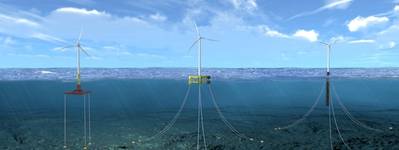AS Mosley, Fugro Get Funding for FOWT Tech
Aberdeenshire-based offshore simulation and analysis company, AS Mosley, Dutch Fugro, together with Strathclyde University, have been awarded funding from The Carbon Trust, to develop new technology for monitoring Floating Offshore Wind Turbines (FOWT).
As one of eight projects to benefit from a share of £1m from The Carbon Trust, the project will see the development of a highly efficient method for measuring fatigue and detecting anomalies in real-time for the renewable energy sector, AS Mosley said Monday.
The system has the potential to vastly reduce operating costs by lowering – or potentially replacing – the need for subsea visual inspection of mooring lines for FOWT, the company said.
The funding was won as part of a competition run by The Carbon Trust, with the objective of accelerating the development and commercialization of floating offshore wind technology, with particular emphasis on mooring systems and Operations & Maintenance (O&M).
AS Mosley will now work alongside its project partners to develop the system, which will take around 12 months to design, the company said.
"Fugro’s and its consortium partners’ objective is to develop cost-effective condition monitoring software that characterises the condition of mooring lines of floating wind turbine assets in respect of wear, corrosion and fatigue. Reducing and/or eliminating the requirement for visual inspection by remotely operated vehicles and divers will reduce costs and offshore health and safety exposure," Fugro said.
Fugro project manager Dr Stuart Killbourn said, “We are delighted to have won this technology development grant from the Carbon Trust and the Scottish Government. We are looking forward to developing a transformative condition monitoring software package for floating structure mooring lines, which will significantly reduce the need for personnel and vessel activities offshore. This is a key enabler towards the deployment of floating wind turbines in Scottish waters and the generation of clean renewable energy to meet the nation’s needs.”
David Bolger, Principal Engineer at AS Mosley, comments: “We are really excited about this project and are looking forward to the challenge of developing a digital twin for these impressive offshore floating wind systems. The new method could potentially be rolled out across the renewable sector, bringing with it improved efficiency, safety and substantial savings for energy companies. We’re also looking forward to working alongside project partners, Strathclyde University and Fugro.”








